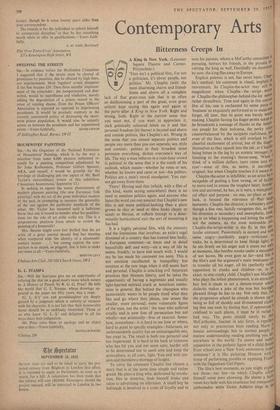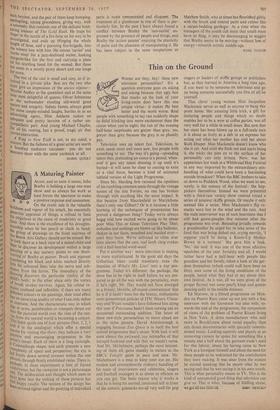Contemporary Arts
Bitterness Creeps In
A King in New York. (Leicester Square Theatre and Cameo- Polytechnic.)
This isn't a political film, I'm not a politician, it's about people, not politics.' Mr. Chaplin (with the most disarming charm and friend- liness and above all a complete lack of that great-man side that is so often so disillusioning a part of the great, even great artists) kept saying this again and again at the party after A King in New York. Right and wrong, both. Right in the narrow sense that you must not, if you want to appreciate it, stick politically coloured labels on it and that personal freedom (its theme) is beyond and above and outside politics, like Chaplin's art. Wrong in the sense that you cannot separate politics and people any more than you can separate, say, style and content : politics in their broadest sense permeate everything, dictate everyone's way of life. The way a man behaves in a rush-hour crowd is political in the sense that it is the result of his outlook, which means—whether he votes or not, whether he knows and cares or not—his politics. Politics are a man's moral standpoint. You can- not get away from them.
There! Having said that (which, with a film of this kind, wants saying somewhere) there is no need to mention politics again, and anyone who hates the word can rest assured that Chaplin's new film is not more political-looking than a plant grown in clay or sand or fibre looks clayey or sandy or fibrous, or reflects (except to a deter- minedly horticultural eye) the sort of manuring it has had.
It is a highly personal film, with the intensity and the limitations that involves; an exile's regal dismissal of a country that has treated him badly, a European comment—at times and in detail beautifully deft and witty—on a way of life he seems, frankly, to have lost touch with. I would say he has made his comment too soon. This is not emotion recollected in tranquillity but emotion at the raw stage when it still seems hurt and personal. Chaplin is attacking evil American practices that threaten liberty, and he takes the opportunity of having a legitimate and usually light-hearted satirical crack at American institu- tions in general. But behind the champion who passionately wants to let people think what they like and go where they please, one senses the smaller, more personal, more vulnerable figure of the man, not the artist : the man who suffered cruelly and is now free of persecution but not wholly—not artistically—free of rancour. Some- how, somewhere—it is hard to see how or where, hard to point to specific examples—bitterness, an understandable quality but an unmanageable one, has crept in. The result is both too personal and too impersonal. It is hard to hit back at someone who has hit you and not seem sore; harder still to be determined not to seen sore and keep the atmosphere, at all costs, light. You end with ten- sion and therefore a shortage of laughs.
To carry his comment Chaplin has chosen a story that is at the same time simple and rather grand. He plays a king who, dethroned by revolu- tion, flies to America, finds himself broke and takes to advertising on television. A small boy he befriends is involved in a crisis of loyalty and to
save his parents, whom a McCarthy committee is pursuing, betrays his friends, in the process in' volving the king as well. Decidedly un-American by now, the king flies away to Europe. Explicit polemic is not, has never been, Char lin's method; his comment is visual, implicit in movements. So Chaplin-the-actor may still be magnificent when Chaplin - the - script - writer or Chaplin-the-philosopher-behind-the-lot seems rather threadbare. Time and again in this uneven, film of his, one is enchanted by some piece 01 'business' so exquisitely performed as to make one forget, till later, that its point was barely worth making. Chaplin having his finger-prints taken 11s he broadcasts a message of thanks to the Amer' can people for their welcome, the perky voice counterbalanced by the incipient ruefulness, not even of the face, which is still overlaid by the cheerful excitement of arrival, but of the fingers themselves as they squash into the ink; or Chaplin being bitten in the leg by an ecstatic teenager; or listening to the evening's theme-song, 'When I think of a million dollars, tears come into eyes'—none of this, as satire, is startlin0 original; but when Chaplin touches it it seems 50 Chaplin-the-actor is infallible; as 'an artist he iS incapable of putting a foot wrong, or of failing to move and to amuse the toughest heart. Instinct' tive and universal, he has, as it were, a metaphori• cal effect and purpose : no one, no place or al" look, is beyond the relevance of that large humanity. Chaplin-the-director, a subsidiary artist though a fine one, luckily recognises this, so that his direction is secondary and unemphatic, look: ing in on what is happening and letting the actor. not the camera, do the most noticeable i013 Chaplin-the-script-writer is the fly in this Par: ticular ointment. Passionately in earnest and With some angry—justifiably angry—criticisms ir make, he is determined to keep things light; 50 he sits firmly on his anger and it oozes out onl! at moments, like bonfire smoke under i mountain of wet leaves. He even goes so far—and this the film's and the argument's main weakness—n,', to transfer all his anger, all his (perfectly valiul opposition to cranks and children—or, to b,c exact, to one cranky child. Chaplin's son Michael who plays the infant phenomenon, is an attracthe boy but is made to act a demon-orator whose dialectic makes a joke of the true but boringl)r phrased things he has to say. Not only that, bt° the progressive school he attends is shown up 3' being so full of shoddy and ill-mannered clown' ing that one ends by feeling that, if opposition i' confined to such places, it must be in rather bad way. The point .should surely be that McCarthyism, fascism in any form, is repelled not only to precocious boys reading Marx If lunatic surroundings, but to normal people 0 mature understanding reading anything you 10'4 anywhere in the world. To centre and isolalc opposition in the pathetic figure of a child fleeing from school into a New York snowstorm makes nonsense : it is like picketing Moscow with e troop of performing poodles or opposing Franco with the Dagenham Girl Pipers. The film's best moments, as you might expect' are those—too few—in which Chaplin allool himself some pure clowning. He shares a bath' room key-hole with his courteous but competitive ambassador while Dawn Addams sings in the bath beyond, and the pair of them keep bumping, apologising, taking precedence, giving way, with a solemnity that reminds one of the delicate boot- eating manner of The Gold Rush. He traps his ling it. in the nozzle of a fire-hose on his way to be investigated, and ends up bringing the whole length of hose, and a pursuing fire-brigade, into the witness box with him. He mimes 'caviar' and `turtle soup' for a jazz-deafened waiter, looking sturgeon-like for the first and carrying a plate on his scuttling hand fdr the second. But these are oases in a mostly prosy desert and one longs
for more.
The rest of the cast is small and cosy, as if in- volved in a private joke. Best are the two who must give an impression of the ancien regime— Maxine Audley as the queenliest and at the same t most delightful of queens, Oliver Johnstone 48 the ambassador exuding old-world good nature and integrity. Sidney James, always good for some simple-minded laughs, hurtles in as an advertising agent, Miss Addams makes an adequate and pretty heroine of a rather un- sympathetic part. And young Michael Chaplin, for all his ranting, has a proud, tragic air that Carries conviction. A King in New York is not, to my mind, a success. But the failures of a great artist are worth 4 hundred mediocre successes : you do not measure them with the same yardstick at all.
ISABEL QUIGLY































 Previous page
Previous page